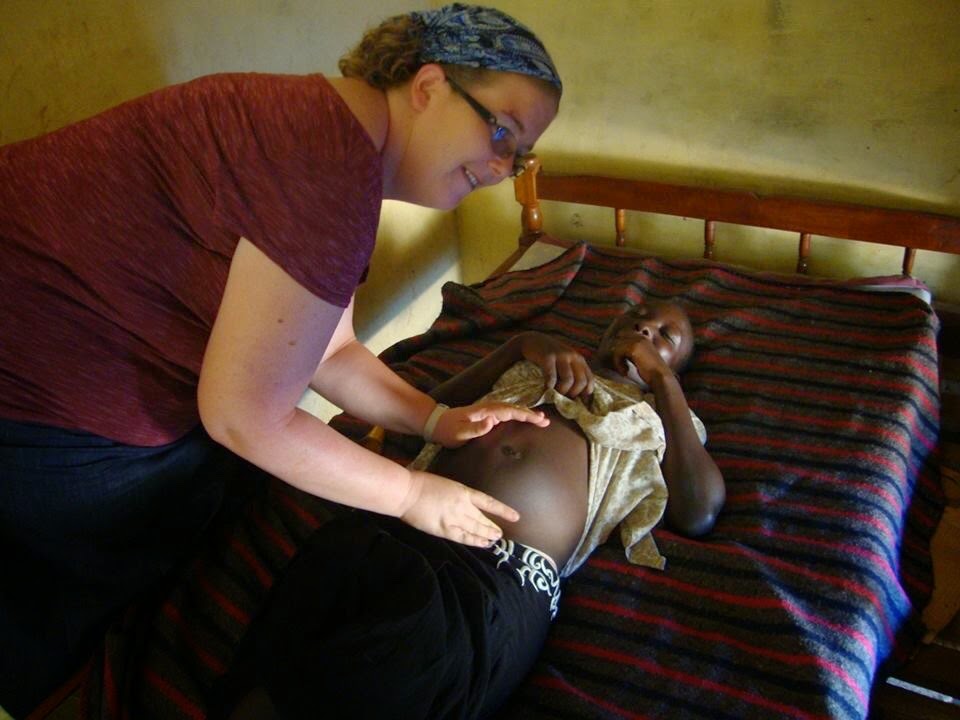 The Mini midwife writes,
The Mini midwife writes,Hi it’s me. I’m here to talk about my trip to Malagita. Mommy and I left super early to go to a prenatal day, there we would meet a lady named Christina, who runs the birth center called Good Samaritan. It is located deep in the back roads in the jungle. We took boda-bodas and I couldn’t help looking at the beautiful sunrise and the wind in my face as we zoomed past cars and trucks where we came to a crowded taxi park. The taxis were in the back of an outside market center. It was super crowded there, with the holidays and all. We practically had to squeeze through while people tried to sell us all kinds of things including shirts, live grasshoppers, and matoke. This was their home their work. I felt like I had stepped into another world. We finally reached our way back to where the taxi was parked. We sat down and it was another hour until we finally left for Malagita. While we waited, we bought hot chapatis from a vendor and ate them in the back of the taxi. We chatted with the local women waiting for the taxi to leave.
When we got there I got to meet Ms Christina. She is wonderful and does everything, takes care of her children,runs the birth center, practically stays up all night for 10 births at least, and doesn’t have a husband to take care of the children so she can rest. There wasn’t any body there yet so we waited around and I signed her guest book. When I signed it I felt important like I was finally a part of this place and now I can stay up with her and help woman give birth. She told me her story about how a midwife was needed, and she started school. Then on a trip to see the Nile River, she came across this small village where a laboring woman was struggling to get onto the crowded taxi she was riding on. She got off right there and has stayed there ever since. The birth center was crowded and her desk was unorganized, she has an ugly blue tablecloth over the desk because people used to write on the desk. The walls were dirty. Trash was piling over the makeshift "trashcan"-- a small box. While we waited for the village mothers to arrive I played with a couple of little girls, as anyone knows me, thought I would. The women began to arrive, they didn’t have appointments, just came whenever they could. My mom started prenatals. I was super excited. The mothers had small booklets instead of files, and you wrote the date at the top and then write how many weeks they were, then wrote their baby’s position, the baby’s heart rate. Easy. We did this over and over again. Each time a mother came in to the room with a smile excited. Then one mother came who’s book said she was around 24 weeks. My mom tried to feel for the baby’s position but couldn’t feel anything. Christina uses a device called a pinard to hear the baby’s heart rate. It is pretty old fashioned, more like a stethoscope than the modern Doppler my Mom is accustomed to using. She uses the pinard at Christina’s because it is best to use what the local birth attendants are using. So we looked for the baby’s heart rate using a pinard, but you really can’t hear a heart beat before 28 weeks with it. So Mom brought out her Doppler which is more accurate Unfortunately she still couldn’t find anything. So we called in Ms Christina for a second opinion and she couldn’t find anything. We told the gal to come back in a few weeks. Once she left we guessed that maybe she actually wasn’t pregnant after all. Can you imagine thinking you were pregnant for 24 weeks and in actuality you were not pregnant? We did more mothers, all the while a mother laid on the floor in very early labour. I felt super bad for her. The labour was too early for us to do anything though, so she just rested on the mat. Lots of young mother’s came,one mother was only fifteen. Some were eighteen, some were sixteen, the same age as my older sister. Just thinking of her lying there us checking up on her makes me feel bad for those young mothers. One young woman’s belly was super warm. We looked at her baby’s heart rate, and it was super high. I got worried, was the baby okay? We later figured out that she had a fever. We gave her medicine for the fever then sent her home. Then it started rain.
















